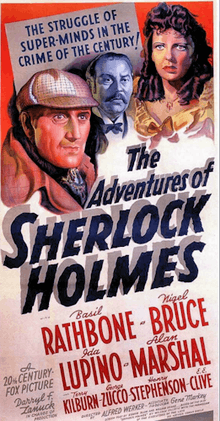The Adventures of Sherlock Holmes (film)
| The Adventures of Sherlock Holmes | |
|---|---|
 1939 US theatrical poster | |
| Directed by | Alfred L. Werker |
| Produced by | Darryl F. Zanuck |
| Written by |
Characters: Arthur Conan Doyle Play: William Gillette Screenplay: Edwin Blum[1] William Drake |
| Starring |
Basil Rathbone Nigel Bruce Ida Lupino George Zucco Alan Marshal |
| Music by | Robert Russell Bennett |
| Cinematography | Leon Shamroy |
| Edited by | Robert Bischoff |
| Distributed by | 20th Century Fox |
Release dates |
|
Running time | 81 minutes |
| Country | United States |
| Language | English |

The Adventures of Sherlock Holmes (released theatrically as Sherlock Holmes in the United Kingdom) is a 1939 mystery-adventure film.[2] It is a pastiche featuring the characters of the Sherlock Holmes series of books written by Sir Arthur Conan Doyle. The film is an adaptation of the 1899 play Sherlock Holmes by William Gillette, though there is almost no resemblance in the plots.
The film is the second installment to the Sherlock Holmes film series released between 1939 and 1946. It was the second film to feature Basil Rathbone as Holmes and Nigel Bruce as Dr. John Watson, the final one they would make for 20th Century Fox, and the final one in the Rathbone/Bruce series to be set in the Victorian London period. The further 12 films made by Universal and starring Rathbone/Bruce would take place in contemporaneous times (i.e. the 1940s). George Zucco stars as Holmes's nemesis Professor Moriarty.
The film follows famous detective Sherlock Holmes and his companion Doctor Watson as they attempt to foil their archenemy Professor Moriarty who targets a wealthy family and plots the theft of the Crown Jewels.
Background
The film was supposedly based on the stage play by William Gillette, though little of the play's original plot remains aside from the Holmes/Moriarty conflict. The play featured a very young Charlie Chaplin in one of his very first acting roles during its first London production, playing the character of Billy, who, in this movie, is played by Terry Kilburn.
Plot
The film begins with Moriarty and Holmes verbally sparring on the steps outside the Old Bailey where Moriarty has just been acquitted on a charge of murder due to lack of evidence. Holmes remarks, "You've a magnificent brain, Moriarty. I admire it. I admire it so much I'd like to present it, pickled in alcohol, to the London Medical Society". "It would make an impressive exhibit", replies Moriarty.
Later Holmes and Watson are visited at 221B Baker Street by Ann Brandon (Ida Lupino). She tells him that her brother Lloyd has received a strange note - a drawing of a man with an albatross hanging around his neck - identical to one received by her father just before his brutal murder ten years before. Holmes deduces that the note is a warning and rushes to find Lloyd Brandon. However he is too late, as Lloyd has been murdered by being strangled and having his skull crushed.
Holmes investigates and attends a garden party, disguised as a music-hall entertainer, where he correctly believes an attempt will be made on Ann's life. Hearing her cries from a nearby park he captures her assailant, who turns out to be Gabriel Mateo, out for revenge on the Brandons for the murder of his father by Ann's father in a dispute over ownership of their South American mine. His murder weapon was a bolas. Mateo also reveals that it was Moriarty who urged him to seek revenge. Holmes realises that Moriarty is using the case as a distraction from his real crime, a crime that will stir the British Empire - an attempt to steal the Crown Jewels. Holmes rushes to the Tower of London to prevent the crime, and during a struggle Moriarty falls, presumably to his death. In the end, Ann is married and Holmes tries to shoo a fly by playing his violin, only to have Watson swat it with his newspaper remarking, "Elementary, my dear Holmes, elementary."[3]
Cast
- Basil Rathbone – Sherlock Holmes
- Nigel Bruce – Dr. Watson
- Ida Lupino – Ann Brandon
- George Zucco – Professor Moriarty
- Alan Marshal – Jerrold Hunter
- E. E. Clive – Inspector Bristol of Scotland Yard
- Terry Kilburn – Billy
- Henry Stephenson – Sir Ronald Ramsgate
- Mary Forbes – Lady Conyngham
Influence
The quote "Elementary, my dear Watson" was made popular by this film. Although it was spoken in the 1929 talkie The Return of Sherlock Holmes, starring Clive Brook, it was never featured in a canonical Arthur Conan Doyle story; although once Holmes said, in "The Adventure of the Crooked Man", "Elementary". The quote "Elementary, my dear Watson" was ranked No. 65 in the AFI's 100 Years... 100 Movie Quotes poll.
During the scene in which Holmes crashes the garden party dressed as a music hall performer, he sings "I Do Like To be Beside the Seaside". This is an anachronism, since the film is set in 1894, but the song was written in 1907.
The scene in which Holmes experiments with the flies in the glass while playing the violin is recreated in the 2009 film Sherlock Holmes, in which Holmes is played by Robert Downey, Jr..
References
- ↑ "Edwin Blum, 89, Writer for Stage And the Screen". The New York Times. May 6, 1995.
- ↑ S. Nugent, Frank (September 2, 1939). "The Adventures of Sherlock Holmes". The New York Times.
- ↑ Davies, David Stuart, Holmes of the Movies (New English Library, 1976) ISBN 0-450-03358-9
External links
- The Adventures of Sherlock Holmes at the Internet Movie Database
- The Adventures of Sherlock Holmes at AllMovie
- The Adventures of Sherlock Holmes at the TCM Movie Database
- The Adventures of Sherlock Holmes
| ||||||